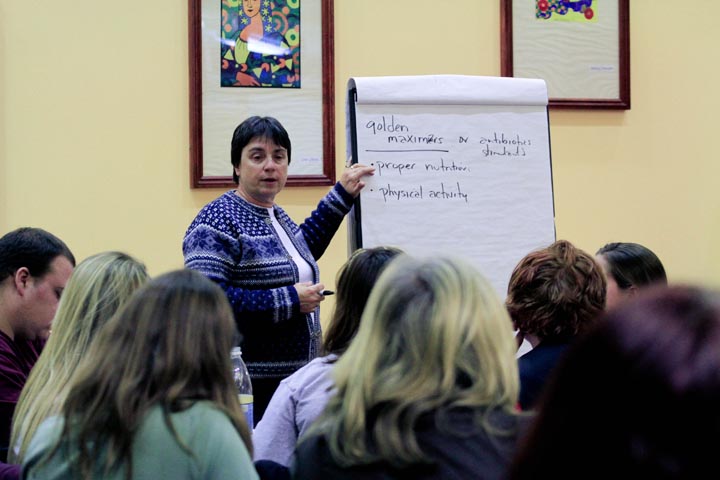As a licensed mental health professional specializing in children, Jeanine Fitzgerald has seen her fair share of acting out in her 34 years of child behavior studies, everything from the “duck lips” stubborn pout to the “duck and cover” because that’s what’s required to avoid injury.
But one thing has remained true throughout her tenure, eight years of which she’s spent with Island families — her goal is to empower people.
Developmental behaviors in children are a symptom, not the problem, Ms. Fitzgerald says, and over the past three years she has turned her attention to studying the effects of nutrition on child development.
Ms. Fitzgerald shared her personal struggles with changing eating habits and the findings of her research Tuesday night at the Martha’s Vineyard Regional High School as part of the Martha’s Vineyard Community Services ongoing lecture series.
The author of The Dance of Interaction: A Guide to Managing Children’s Challenging Behaviors, Ms. Fitzgerald is contracted through Community Services and visits the Island once a month for one to three-day periods. When here, she meets with parents, visit schools or child care programs to do assessments on individual students or teachers and conduct trainings for parents and teachers, such as Tuesday night’s session. And she does it all free of charge.
Through Community Services, Ms. Fitzgerald works with families of preschool and early school-aged children on parenting strategies, understanding a child’s temperament and developmental stage.
Ms. Fitzgerald does that through workshops, private parenting and group consultations, sometimes working with the parent and teacher to determine which strategy would make the child most successful. On Tuesday night she spoke about the effects of nutrition. On Wednesday morning she led a workshop on teaching children self-regulation, followed by exploring positive guidance for children who speak Portuguese.
On the Vineyard she works with mostly younger families where she sees a range of developmental behaviors, she said.
“We’ll see anything from children struggling with executive functions [such as planning, problem solving and attention] to families that are multi-stressed trying to figure out how to raise healthy children . . . to parents and teachers who are trying to understand the temperaments of children and what to do with the strong-willed or highly sensitive child,” she said.
Prevention and support are key to keeping emotions at bay, and to maximize the potential of a child’s brain there are two options, Ms. Fitzgerald said — either through alternative approaches or prescription drugs. Ms. Fitzgerald prefers the alternative approach, and that includes eating well.
“Before we move to medication maybe there are some things we can do that can help people function more optimally and we should pursue those things first,” she said.
The alternative approaches are categorized into seven so-called golden maximizers: proper nutrition, physical activity, relaxation, support networks and relationships, novelty and exposure to new things, meaningful and relevant learning, and complexity or the right amount of challenge.
Nutrition, physical activity and relaxation are the three most important maximizers, Ms. Fitzgerald said, but if you had asked her three years, ago nutrition would not have made the top cut.
Ms. Fitzgerald began her research due to personal experience — she noticed significant mood and behavior changes once she dropped the Big Macs and started eating healthier foods.
She acknowledged Vineyarders eat differently here, and better.
“We’d go to Slice of Life and I wouldn’t even know what to order because I don’t know what [the menu items] were,” she said. “Arugula . . . sounded like something dangerous. I’d come to night meetings and they would serve us butternut squash soup and I thought, oh you gotta be kidding me — I come here and they’re serving me baby food.” She continued:
“What I noticed in doing that is that I started to feel different and I started to behave differently and my thinking started to clear up and there were some stark differences,” she continued. “My mood improved, I wasn’t so Debby Downer all the time.”
Ms. Fitzgerald said she had parents asking her “there’s got to be another way, I don’t want to medicate my kids. Nutrition isn’t the cure for everything but it is a key to development that’s worth considering.”
The greatest trend Ms. Fitzgerald sees is the growing number of over-diagnoses and misdiagnoses for things such as attention deficit disorder and learning disabilities without looking at the entire picture. She said nutrition can often be a good starting point.
The current generation of school aged children in the country has the highest rate of food allergies, obesity, behavioral, emotional and learning challenges in the history of the United States, Ms. Fitzgerald said, as well as the highest incidence of autoimmune disease. Nationally, on average between three and seven per cent of school-aged children are diagnosed with some form of attention deficit disorder, Ms. Fitzgerald said.
“We’re not doing a holistic look at evaluation,” she said. “I think that’s a consistent trend across the whole country, that we’re using labels to treat whole symptoms instead of addressing the causes . . . .”
Returning to her central theme of nutrition, she said: “What we eat has bearing on our moods, our energy, our susceptibility to illness, weight, appearance aging — nutrition has an influence on all areas of your life.”
She advocates a diet of lean protein, fresh fruits and vegetables, fewer carbohydrates and plenty of water. But she is not a purist.
“Don’t leave here thinking, I screwed up my kids because they ate a fruit roll-up instead of fruit,” she said. “But raise your awareness about how significant nutrition is in terms of maximizing the potential of your child and yourself. Hopefully sometime in the future we can get back to grounded diagnoses and medication for those who truly need it, instead of what our society finds as the quick fix and hands out like candy.”
To schedule an appointment with Jeanine Fitzgerald contact Marney Toole at 508-693-7900 extension 283. To reach Ms. Fitzgerald, e-mail tpfitz45@aol.com.





Comments
Comment policy »